2-Month Study Plan for Science Olympiad Class 3 | Science Olympiad for Class 3 PDF Download
Hello, young scientists! The Science Olympiad for Class 3 is a fun way to test your brain and learn cool things about the world. This exam has two parts: Logical Reasoning, where you solve puzzles, and Science, where you explore topics like plants, animals, and the stars. There’s also a special Achievers Section with tricky questions to make you think harder. This 8-week study plan is made just for you to help you get ready step by step. Let’s dive in and get ready to shine in the Olympiad!
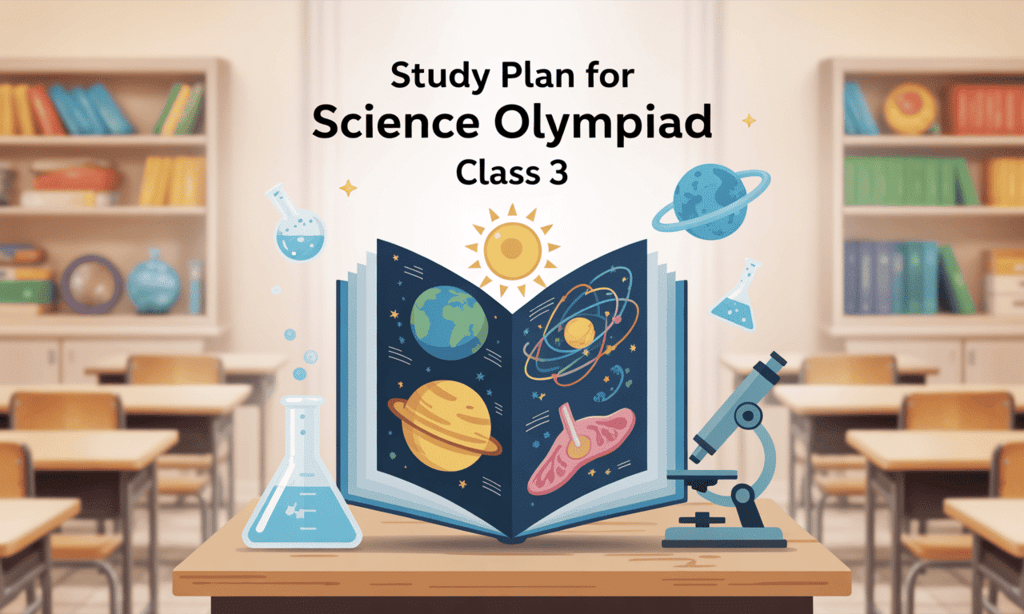
Week 1: Starting with Logical Reasoning
Day 1: Patterns
Learn about patterns, like numbers or shapes that repeat. Try to find what comes next!
- Read: Notes: Patterns
- Watch: Understanding Patterns
- Practice: Solve 5 questions from Olympiad Test Level 1: Patterns
Day 2: Analogy
Find out how things are similar, like how a cat is to a kitten, a dog is to a puppy.
- Read: Analogy and Classification
- Study: Analogy - 1
- Practice: Try 5 questions from Olympiad Test Level 1: Analogy
Day 3: Alphabet Test
Play with letters! Learn the alphabet order and solve letter puzzles.
- Read: Alphabet Test
- Study: Alphabet Test
- Practice: Solve 5 questions from Olympiad Test Level 1: Alphabet Test
Day 4: Coding and Decoding
Learn secret codes! Figure out how letters or numbers change in a pattern.
- Read: Coding - Decoding
- Study: Coding - Decoding
- Practice: Try 5 questions from Olympiad Test Level 1: Coding-Decoding
Day 5: Fun Review
Look back at patterns and analogy using a mind map. Play a quick quiz with family!
- Review: Mindmap: Patterns
- Review: Mindmap: Analogy and Classification
- Practice: Ask a parent to quiz you on 5 questions from the week.
Day 6-7: Rest and Play
Take a break, draw some patterns, or play a game with letters to keep learning fun!
Week 2: More Logical Reasoning Fun
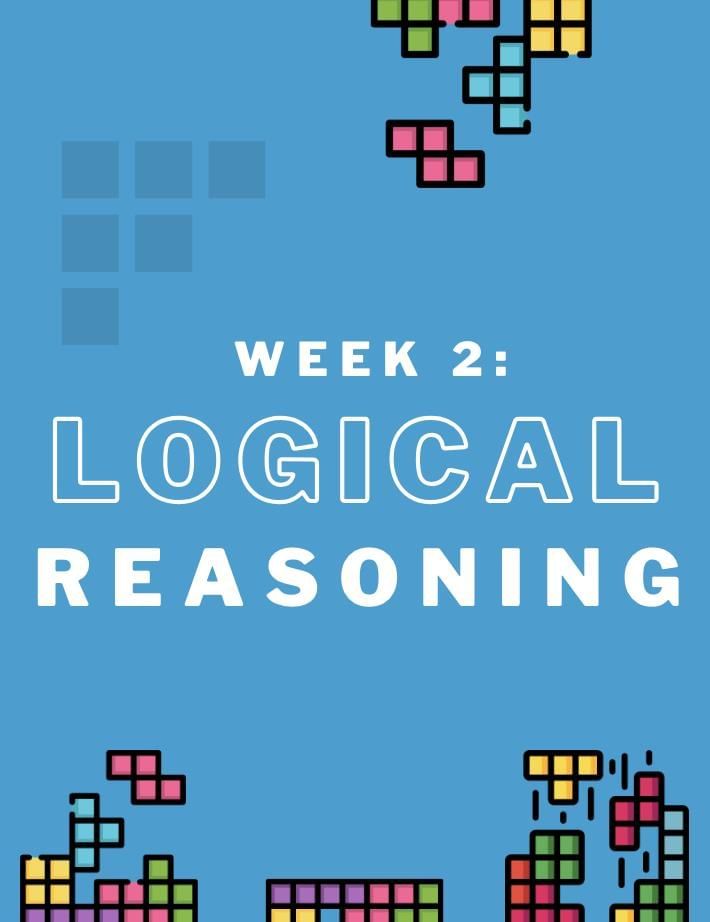
Day 1: Ranking Test
Learn how to find who’s first, second, or last in a line or group.
- Read: Notes: Ranking Test
- Study: Ranking Test
- Practice: Solve 5 questions from Olympiad Test Level 1: Ranking Test
Day 2: Grouping of Figures
Group shapes that look similar and solve figure puzzles.
- Read: Grouping of Figures and Figure Matrix
- Study: Grouping of Figures and Figure Matrix
- Practice: Try 5 questions from Olympiad Test Level 1: Grouping
Day 3: Mirror Images
Discover how shapes look in a mirror. It’s like a fun reflection game!
- Read: Mirror Images
- Study: Mirror Images - 1
- Practice: Solve 5 questions from Olympiad Test: Mirror Images - 1
Day 4: Geometrical Shapes
Learn about circles, squares, and triangles. Find them in everyday objects!
- Read: Notes: Geometrical Shapes
- Study: Geometrical-Shapes
- Practice: Try 5 questions from Olympiad Test: Geometrical Shapes - 1
Day 5: Fun Review
Use a mind map to review ranking and mirror images. Draw some shapes for fun!
- Review: Mindmap: Mirror Images
- Review: Mindmap: Geometrical Shapes
- Practice: Draw 3 shapes and their mirror images.
Day 6-7: Rest and Play
Relax, play a puzzle game, or look for shapes around your house!
Week 3: Exploring Science - Plants and Animals
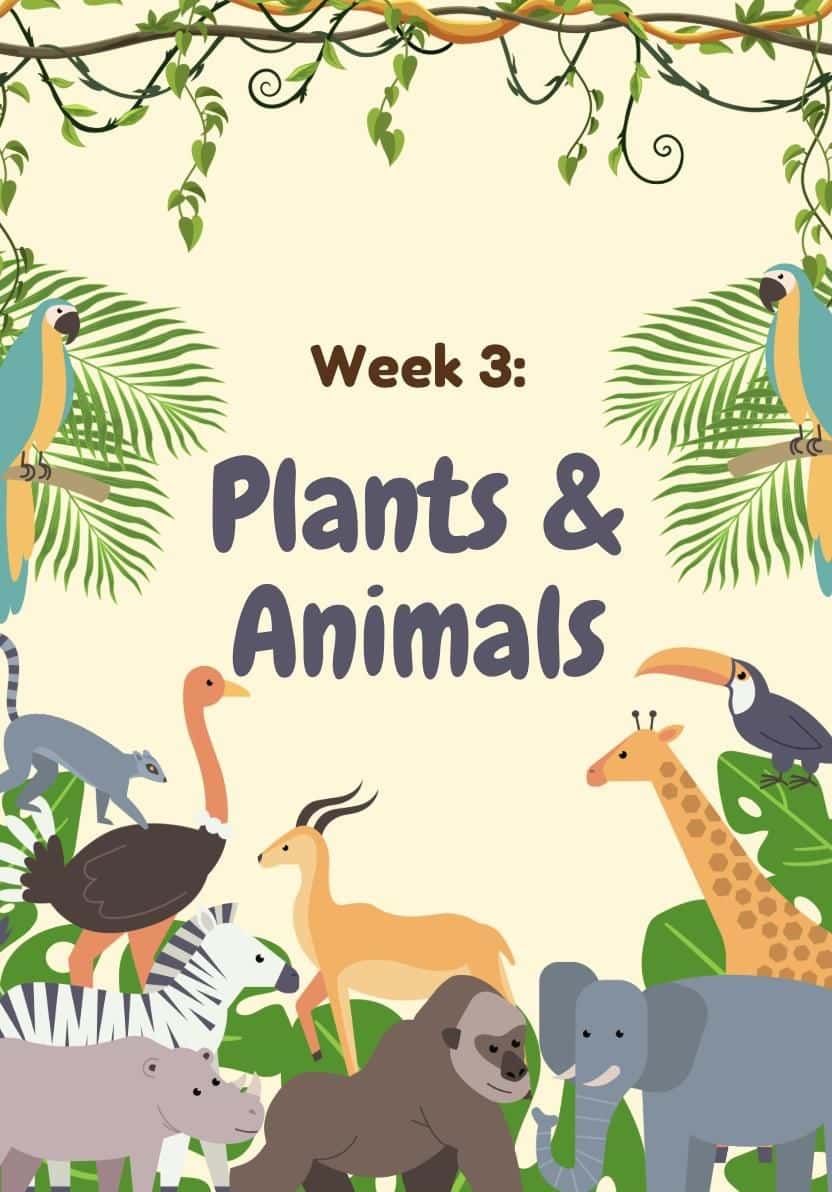
Day 1: Parts of a Plant
Learn about roots, stems, leaves, and flowers. Look at a plant at home!
- Read: Chapter Notes: Parts of a Plant
- Study: Parts of a Plant
- Practice: Solve 5 questions from Olympiad Test Level 1: Plants and Animals
Day 2: Animals and Their Food
Find out what animals eat, like how cows eat grass and lions eat meat.
- Read: Chapter-Notes-Animals-Feeding-Habits
- Study: Animals: Feeding Habits
- Practice: Try 5 questions from Olympiad Test Level 1: Plants and Animals
Day 3: Birds
Learn about birds, their food, and how they fly. Spot a bird outside!
- Read: Chapter Notes: Birds: Food and More
- Study: Birds: Food and More
- Practice: Solve 5 questions from Olympiad Test Level 1: Birds and Common Insects
Day 4: Insects
Discover insects like butterflies and ants. Learn what makes them special.
- Read: All About Insects
- Practice: Try 5 questions from Olympiad Test Level 1: Birds and Common-Insects
- Activity: Draw your favorite insect!
Day 5: Fun Review
Use flashcards to review plants and animals. Tell a parent about a bird you like!
- Review: Flashcards: Parts of a Plant
- Review: Flashcards: Birds
- Practice: Quiz yourself on 5 plant or animal facts.
Day 6-7: Rest and Play
Take a break, water a plant, or watch birds in your garden!
Week 4: Science Adventures - Nature and Body
Day 1: Soil
Learn about soil and how it helps plants grow. Touch some soil if you can!
- Read: Chapter Notes: Soil
- Study: Concept of Soil
- Practice: Solve 5 questions from Olympiad Test Level 1: Soil, Water and Weather
Day 2: Water and Weather
Explore water and weather, like rain and sun. What’s today’s weather?
- Read: Chapter-Notes-Air-and-Water
- Study: Weather and Seasons
- Practice: Try 5 questions from Olympiad Test Level 1: Soil, Water and Weather
Day 3: Human Body
Learn about your body, like your heart and lungs. Point to them on yourself!
- Read: Chapter Notes: Human Body: Organ Systems
- Study: Human Body Organs
- Practice: Solve 5 questions from Olympiad Test Level 1: Human Body
Day 4: Earth and Universe
Discover Earth and the solar system. Can you name some planets?
- Read: Chapter Notes: The Earth
- Study: Solar System
- Practice: Try 5 questions from Olympiad Test Level 1: Earth and Universe
Day 5: Fun Review
Use flashcards to review soil and the human body. Draw a planet!
- Review: Flashcards: Soil
- Review: Flashcards: Human Body - Organ Systems
- Practice: Draw your favorite planet and name it.
Day 6-7: Rest and Play
Relax, look at the sky, or play with water to learn about it!
Week 5: Science and Logical Reasoning Mix
Day 1: Light, Sound, and Force
Learn about light, sound, and force, like pushing or pulling things.
- Read: Chapter Notes: Light, Sound and Force
- Study: Light
- Practice: Solve 5 questions from Olympiad Test Level 1: Light, Sound and Force
Day 2: Food
Find out why we need food and what kinds of food are healthy.
- Read: Chapter Notes: Food
- Study: Food: Explanation
- Practice: Try 5 questions from Olympiad Test Level 1: Food
Day 3: Number Series
Play with numbers! Find the next number in a sequence, like 2, 4, 6.
- Read: Number Series
- Study: Number Series - 1
- Practice: Solve 5 questions from Olympiad Test Level 1: Number Series
Day 4: Embedded Figures
Find hidden shapes inside bigger shapes. It’s like a treasure hunt!
- Read: Embedded Figures
- Study: Embedded Figures
- Practice: Try 5 questions from Olympiad Test: Embedded Figures - 1
Day 5: Fun Review
Use a mind map to review light and food. Make a number pattern!
- Review: Mindmap: Light, Sound and Force
- Review: Mindmap: Number Series
- Practice: Create a number pattern (e.g., 1, 3, 5) and show it to a parent.
Day 6-7: Rest and Play
Take a break, listen to sounds around you, or try pushing a toy car!
Week 6: Everyday Science and Reasoning
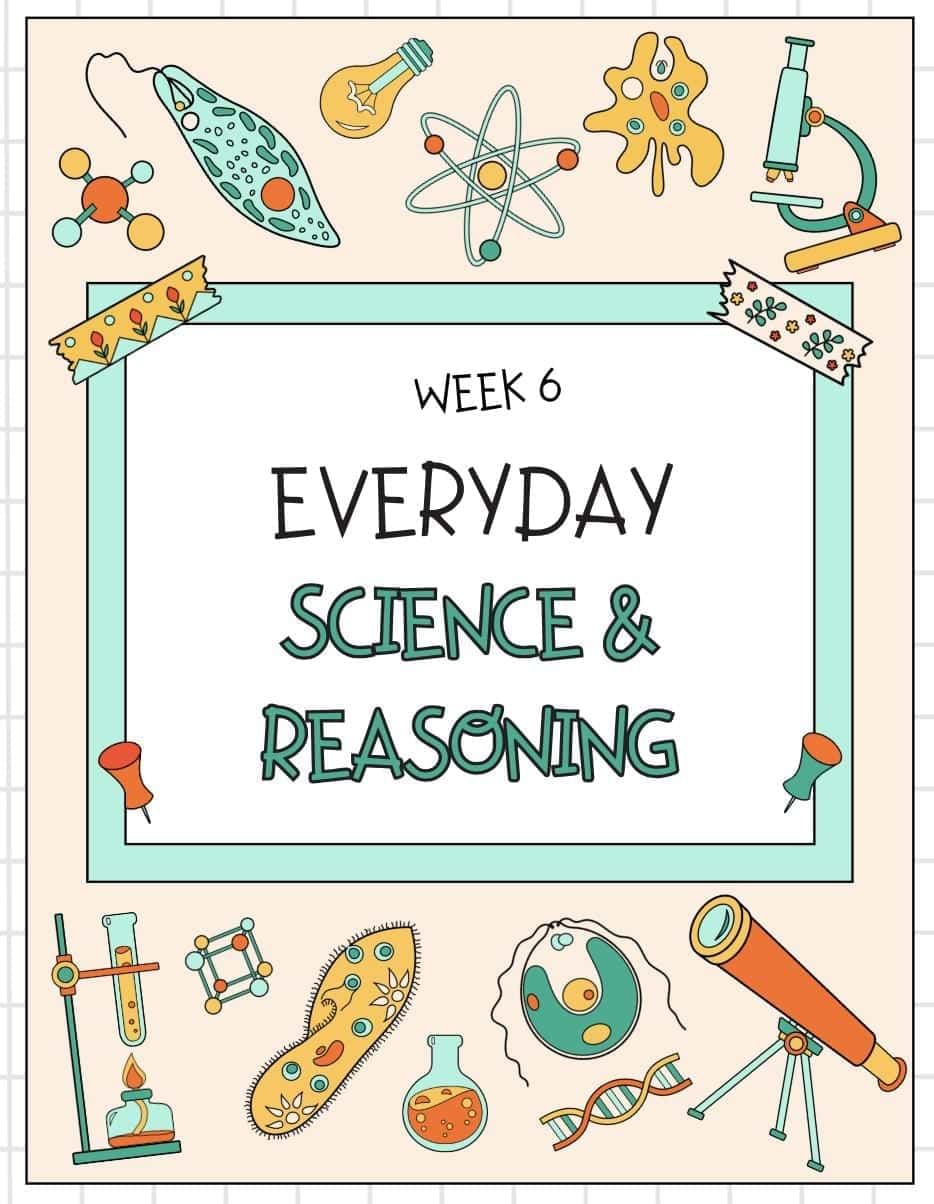
Day 1: Housing and Clothing
Learn about houses and clothes for different weather. What do you wear today?
- Read: Chapter Notes: Housing and Clothing
- Study: Housing and Clothing
- Practice: Solve 5 questions from Olympiad Test Level 1: Housing and Clothing
Day 2: States of Matter
Explore solids, liquids, and gases. Find examples at home, like water or ice!
- Read: Chapter Notes: States of Matter
- Study: States of Matter
- Practice: Try 5 questions from Olympiad Test Level 1: Forms of Matter and Materials
Day 3: Transport and Communication
Learn about cars, trains, and how we talk, like phones or letters.
- Read: Notes: Transport and Communication
- Study: Mode of Transport
- Practice: Solve 5 questions from Olympiad Test Level 1: Transport and Communication
Day 4: Blood Relations
Learn about family members, like who is your sister or cousin.
- Read: Blood Relations
- Study: Blood Relations
- Practice: Try 5 questions from Olympiad Test: Blood Relations - 1
Day 5: Fun Review
Use flashcards to review matter and transport. Draw a car or house!
- Review: Flashcards: States of Matter
- Practice: Draw your favorite vehicle and show it to someone.
Day 6-7: Rest and Play
Relax, pretend to be a train, or talk about your family!
Week 7: Environment and Tricky Questions
Day 1: Resource and Pollution
Learn about saving water and keeping the Earth clean.
- Read: Chapter Notes: Resource and Pollution
- Study: What is pollution?
- Practice: Solve 5 questions from Olympiad Test Level 1: Resource and Pollution
Day 2: Safety Rules
Learn how to stay safe, like crossing the road or using scissors.
- Read: Chapter Notes: Good Habits and Safety Rules
- Study: Good Habits and Safety Rules
- Practice: Try 5 questions from Olympiad Test: Good Habits and Safety Rules
Day 3: Our Environment
Discover how to care for trees, animals, and the air around us.
- Read: Chapter Notes: Our Environment
- Study: Our Environment
- Practice: Solve 5 questions from Test: Our Environment - 1
Day 4: High-Order Thinking Skills (HOTS)
Try some tricky questions that make you think hard!
- Practice: Solve 5 questions from High Order Thinking Skills (HOTs) - 1
- Practice: Try 5 questions from High Order Thinking Skills (HOTs) - 2
Day 5: Fun Review
Use a mind map to review the environment. Talk about safety with a parent!
- Review: Mindmap: Our Environment
- Review: Flashcards: Safety And First Aid
- Practice: Tell a parent 3 safety rules you learned.
Day 6-7: Rest and Play
Relax, pick up litter outside, or practice a safety rule!
Week 8: Final Revision
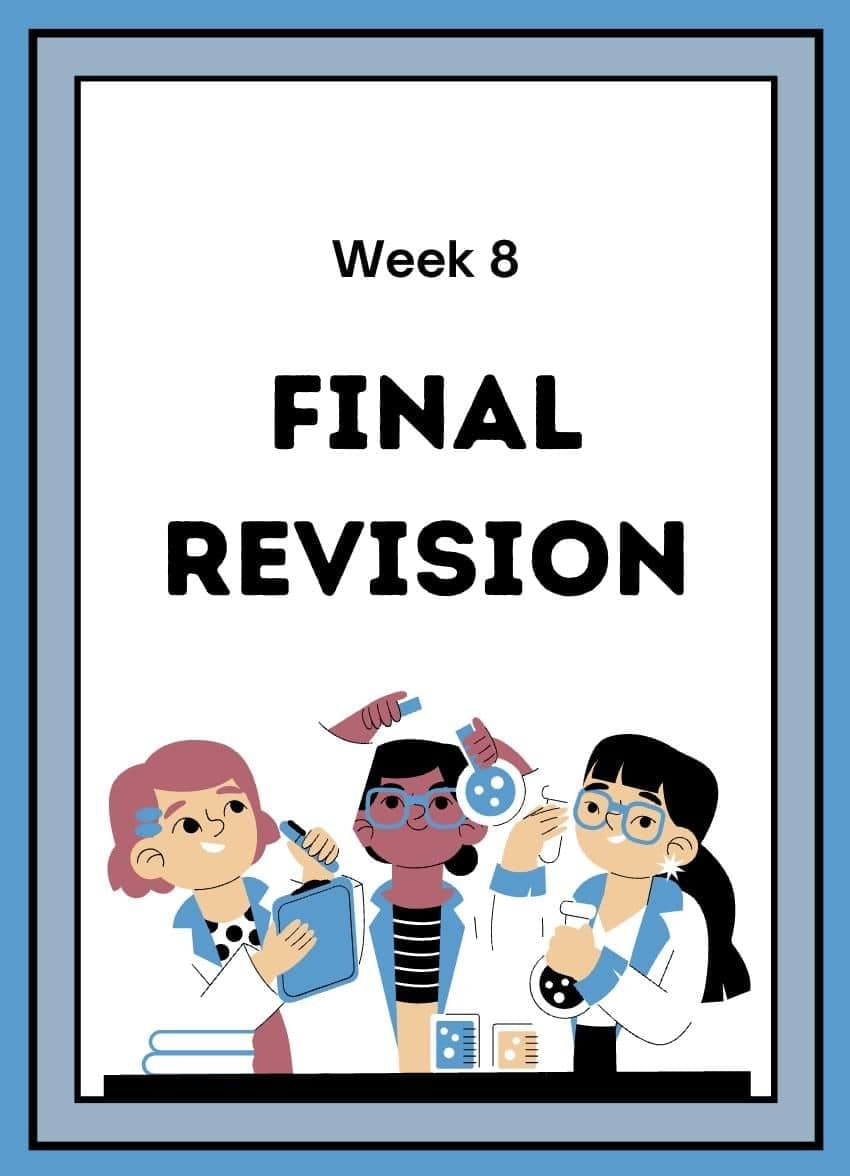
Day 1: Review Logical Reasoning
Go over patterns, coding, and mirror images with flashcards.
- Review: Mindmap: Patterns
- Practice: Try 5 questions from Olympiad Test Level 2: Patterns
Day 2: Review Science Favorites
Look back at plants, animals, and the human body with flashcards.
- Review: Flashcards: Plants and Animals Live Together
- Practice: Solve 5 questions from Olympiad Test Level 2: Plants and Animals
Day 3: Previous Year Questions
Try questions from old Olympiad papers to see what the exam is like.
- Practice: Solve 5 questions from Science Olympiad Previous Year Questions - 1
- Practice: Try 5 questions from Science Olympiad Previous Year Questions - 2
Day 4: Mock Test
Take a practice test like the real exam. Time yourself!
- Practice: Try Science Olympiad Model Test Paper - 1
- Review: Check your answers and ask a parent for help with mistakes.
Day 5: Final Review
Look at your favorite topics and use mind maps to remember them.
- Review: Mindmap: Solar System
- Review: Flashcards: Our Environment
- Practice: Quiz yourself on 5 favorite facts.
Day 6: Final Mock Test
Take another practice test and feel ready for the Olympiad!
- Practice: Try Science Olympiad Model Test Paper - 2
- Review: Smile, you’re almost there!
Day 7: Relax and Get Ready
Rest, draw something you learned, and get excited for the exam!
Tips for Success
- Study a Little Each Day: Spend 20-30 minutes learning to keep it fun.
- Use Pictures: Look at mind maps and flashcards to make things easy to remember.
- Play and Learn: Draw shapes, spot birds, or find water at home to connect with lessons.
- Ask Questions: Talk to parents or teachers if something is tricky.
- Time Yourself: Practice questions with a timer to get faster.
- Take Breaks: Rest after studying to stay happy and focused.
- Have Fun: Enjoy learning and be proud of trying your best!
|
43 videos|103 docs|63 tests
|
FAQs on 2-Month Study Plan for Science Olympiad Class 3 - Science Olympiad for Class 3
| 1. What is the Science Olympiad, and how does it benefit third-grade students? |  |
| 2. How can students prepare effectively for the Science Olympiad? |  |
| 3. What types of events are included in the Science Olympiad for third graders? |  |
| 4. What resources are available for third graders participating in the Science Olympiad? |  |
| 5. How can parents support their children in Science Olympiad preparation? |  |





















